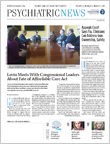Synthetic oxytocin (Pitocin) is widely used in obstetric medicine to induce and/or augment labor and reduce post-delivery bleeding. A study published January 30 in Depression and Anxiety now suggests women who receive synthetic oxytocin during childbirth may be more likely to experience postpartum depression or anxiety.
The findings came as a surprise to lead author Kristina Deligiannidis, M.D., who noted that oxytocin is known to promote positive feelings and strengthen the bond between a mother and child. She said the study demonstrates how much remains unknown about the role of oxytocin in the body.
“We know how oxytocin affects uterine contraction, which is what it is used for during labor. But so many other tissues including the brain have oxytocin receptors, which can lead to a range of unintended consequences when we manipulate this hormone system during delivery,” said Deligiannidis, who is an associate professor of psychiatry and obstetrics and gynecology at Hofstra Northwell School of Medicine in Glen Oaks, N.Y.
Deligiannidis and her colleagues used data available through the Massachusetts Integrated Clinical Academic Research Database (MiCARD) to analyze postpartum outcomes for all women who had a live birth at University of Massachusetts Memorial Health Care between January 2005 and April 2014.
The sample included 9,684 deliveries with peripartum synthetic oxytocin exposure (defined as within two weeks of delivery date) and 37,048 deliveries without peripartum synthetic oxytocin exposure. Depressive or anxiety disorders, defined as a record of diagnosis and/or receipt of antidepressant or anxiolytic medication prescription, were divided into three timeframes: pre-pregnancy (diagnosis/prescriptions more than one year before delivery), pregnancy (diagnosis/prescription during pregnancy or 40 weeks ahead of delivery date), and postpartum (diagnosis/prescription one year following delivery).
The analysis showed that women with no history of pre-pregnancy depression or anxiety who were exposed to synthetic oxytocin had a 32 percent increased risk of postpartum depression or anxiety compared with non-exposed women, while women with pre-pregnancy symptoms had a 36 percent increased risk.
Deligiannidis and her colleagues also explored whether multiple births altered the depression/anxiety risk following Pitocin exposure by comparing outcomes following the first birth (index birth) or one birth at random from women with multiple births. Both approaches yielded roughly similar results: when analyzing only index deliveries, oxytocin exposure resulted in a 35 percent increased risk of postpartum depression or anxiety, and among all random births the risk was 39 percent.
The researchers also found that the oxytocin-related risks were elevated in both vaginal and caesarian births, and that excluding all pre-term births did not change the results.
Deligiannidis, who is also director of Women’s Behavioral Health at Hofstra’s Zucker Hillside Hospital, told Psychiatric News that limitations of the study mean many unanswered questions remain. For example, because the investigators lumped all oxytocin exposure into one category there was no way of knowing whether risks were higher for women exposed to the synthetic hormone for longer periods during labor induction and augmentation. It was also not possible for the researchers to determine whether the relationship between peripartum synthetic oxytocin administration and postpartum depression and anxiety is causal.
“Before we can make any firm conclusions, we need to better understand how these different indications for oxytocin might affect risk,” Deligiannidis said.
Until there is more evidence to suggest oxytocin is driving postpartum depression and anxiety, Deligiannidis said she believes it is too early to suggest that women who receive synthetic oxytocin during childbirth should receive extra monitoring for postpartum depression or anxiety. Fortunately, the overall awareness of postpartum depression has grown to the point where most doctors do already discuss it during postpartum visits, she added.
This study was funded by grants from the National Center for Advancing Translational Sciences and the National Institute of Mental Health. ■
An abstract of “Association of Peripartum Synthetic Oxytocin Administration and Depressive and Anxiety Disorders Within the First Post-partum Year” can be accessed
here.

